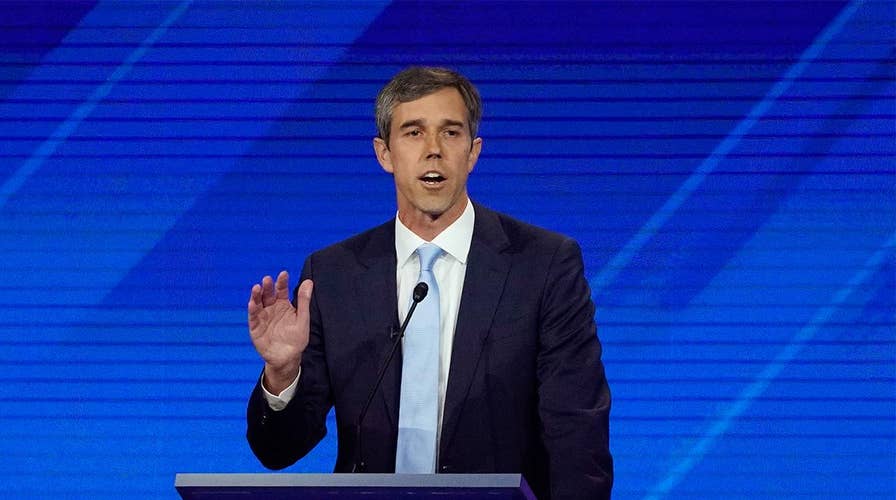Beto O'Rourke sparks heated gun control debate
Talk radio hosts Arnie Arnesen and Jimmy Barrett debate what both the Republican and Democratic Parties are proposing for new gun control legislation.
Democratic presidential candidate Beto O’Rourke on Thursday unveiled his plan to legalize marijuana at both the federal and state level, remove the drug from the controlled substances list and grant clemency to those serving prison time for marijuana convictions.
The proposal from the former congressman from Texas would expunge the records of those convicted of marijuana possession and release those currently serving sentences in prisons for nonviolent marijuana offenses. O’Rourke emphasized that he wants to assist those “injured by the war on drugs” by providing “drug war justice grants,” which would be funded by a federal tax on the marijuana industry.
YANG VOWS MASS PARDON FOR THOSE CONVICTED OF NON-VIOLENT MARIJUANA OFFENSES
The O’Rourke campaign told Fox News that 11,500 people are currently incarcerated in federal prisons for nonviolent marijuana offenses and that they would be eligible for clemency.
Republicans hit back at O'Rourke, who in recent weeks has been embracing other liberal positions, like calling for the confiscation of certain firearms.
"Say it ain’t so, Beto. First, grab guns of law abiding citizens and now legalize marijuana?" Texas GOP Sen. John Cornyn tweeted.
O’Rourke is calling for the regulation of marijuana similar to how alcohol is regulated. That would include requiring IDs to buy marijuana, limiting its use in public areas and focusing on deterring driving under the influence and limiting its use in public spaces. O’Rourke proposes “an aggressive advertising campaign” to deter driving under the influence of marijuana and the use by minors.
O’Rourke’s plan comes as no surprise as he was one of the first candidates in the record-setting field of Democratic White House hopefuls to call for marijuana legalization.
A majority of the Democratic presidential contenders are proposing legalizing marijuana, but O’Rourke’s one of only a handful of candidates – along with Sens. Cory Booker of New Jersey and Kamala Harris of California – to call for the criminal records of those convicted of marijuana possession to be expunged. Tech entrepreneur Andrew Yang has also said he would pardon those in jail for nonviolent marijuana offenses.
WHERE O'ROURKE STANDS IN LATEST FOX NEWS 2020 POLL
Legalizing marijuana and ending the war on drugs has long been a crusade for O’Rouke, dating back to his days a decade ago as an El Paso council member. In 2011, he co-wrote a book titled "Dealing Death and Drugs: The Big Business of Dope in the U.S. and Mexico.” And he used the issue to defeat an incumbent Democratic congressman and win election to the House of Representatives a year later.
In unveiling his plan, O’Rourke highlighted the toll the war on drugs has taken on minority communities across the country.
“We need to not only end the prohibition on marijuana, but also repair the damage done to the communities of color disproportionately locked up in our criminal justice system or locked out of opportunity because of the War on Drugs,” he said in a statement.
“These inequalities have compounded for decades, as predominantly white communities have been given the vast majority of lucrative business opportunities, while communities of color still face over-policing and criminalization. It’s our responsibility to begin to remedy the injustices of the past and help the people and communities most impacted by this misguided war," he added.
While President Trump has hinted at relaxing strict federal marijuana laws, it’s the states that have taken the lead. Eleven states and the District of Columbia have legalized recreational marijuana, while 33 states have legalized medical marijuana and 14 have decriminalized the drug.













































